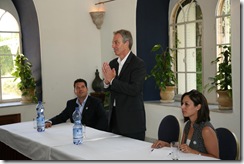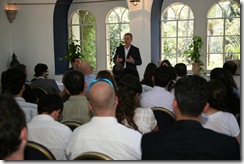Tony Blair Meets OV Youth Leaders; OneVoice youth call for creation of Quintet
Tony Blair Meets With OneVoice Palestinian and Israeli Youth Leaders in Jerusalem
Grassroots Youth Leaders Call for the Creation of a “Quintet”,
Adding a Fifth Arm for Civil Society Movements
Jerusalem, June 20, 2008 – In a meeting at the American Colony Hotel earlier today, Tony Blair—the Representative for the Middle East Quartet – pledged his support for the OneVoice Movement, an international grassroots collective of Americans, Europeans, Arabs, Palestinians and Israelis, predominantly youth, using civic engagement to call for immediate and uninterrupted negotiations for a two-state solution that will lead to ending occupation and all kinds of violence and the establishment of a viable independent Palestinian state at peace with Israel.
OneVoice youth leaders—25 Israelis and 25 Palestinians–suggested the “Quartet” be expanded to a “Quintet”, where the fifth arm would have representation from civil society movements like OneVoice. Youth leaders asked Mr. Blair for the Quartet’s help in connecting them with international leaders, saying they find it difficult to access high-level officials with a vested interest in the Palestinian-Israeli peace process, such as U.S. Secretary of State Condoleezza Rice.
OneVoice youth leaders told Mr. Blair they are frustrated with the ongoing bloodshed and stalls in peace talks, and that elected officials must be both held accountable for and supported in their efforts at reaching a sustainable peace. As long as violence continues to escalate on both sides of the conflict, OneVoice leaders say they cannot rely on the peace process to sustain itself, or their governments to continue negotiating. Rather, they need the support of international leadership to bolster civic engagement.
Mr Blair said: “both nations face a great deal of difficulty, but there is no alternative to the two state solution. To change the realities on the ground the grassroots need to be involved in the process and that is exactly what OneVoice is doing”.
Mr. Blair recognized that there are limits to what politicians can do, and that grassroots mobilization of a moderate majority is the missing link to lasting and substantive negotiations.
He urged OneVoice’s youth leaders “the real change can only come from you- the leaders of OneVoice, the grassroots- make the change and the political leaders will follow you”.
Daniel Lubetzky, Founder of the OneVoice Movement was encouraged by today’s meeting, viewing it as a positive step in empowering civil society committed to peace in the region. “We are honoured that Mr Blair took the time to meet with our youth leaders. If negotiations are to lead to a sustainable and real peace, they cannot exist in isolation, entirely behind closed doors – the people have to be incorporated into the process and feel connected to what goes on at the top levels,” Lubetzky said. “We hope that this meeting is one step among many to making that critical connection.”
About the OneVoice Movement:
The OneVoice Movement is an international mainstream grassroots movement with over 600,000 signatories in roughly equal numbers both in Israel and in Palestine, and 3,000 highly-trained youth leaders. It aims to amplify the voice of the overwhelming but heretofore silent majority of moderates who wish for peace and prosperity, empowering them to demand accountability from elected representatives and work toward a two-state solution guaranteeing an end to occupation and the establishment of a viable, independent Palestinian state at peace with Israel. OneVoice counts on its Board over 60 foremost dignitaries and business leaders across a wide spectrum of politics and beliefs, joining as OneVoice for conflict resolution. Learn more by visiting www.OneMillionVoices.org.
About the Middle East Quartet:
The Middle East Quartet, sometimes call the Diplomatic Quartet or simply the Quartet, is a foursome of nations and international entities involved in mediating the peace process in the Israeli-Palestinian conflict. The Quartet includes the United States, Russia, the European Union and the United Nations. The group was established in Madrid in 2002, as a result of the escalating conflict in the Middle East by Spanish Prime Minister Aznar. Tony Blair is the Quartet’s current Representative.
related posts
-
Tony Blair Endorses OneVoice Summit at Meeting with OneVoice Activists Today
Wowa! Two delegations of OneVoice Youth leaders met with fmr UK Prime Minister Tony Blair earlier today, where he warmly and enthusiastically endorsed the OneVoice Summit. A press release should come out soon. Blair is one of the most impressive global leaders, in my opinion highly under-appreciated by the British people, but then again, it [...]
-
Tony Blair Recommends OneVoice to British Government
Full Transcript here. Some excerpts: Q151 Hugh Bayley: I agree, from my visits to the region, that a majority on both sides want peace, and the only prospect for that is to have a two-state solution, but the majority who want peace are marginalised time and again by acts of violence, whether it is a [...]
-
Tony Blair Reaffirms Support for OV in Davos
David Levin, chair of the OneVoice International Steering Committee, arranged for us to brief Tony Blair in Davos, following his meeting with our youth leaders a couple months ago. He was very impressed with our youth leaders and expressed his commitment to help us advance our mission of empowering the voice of ordinary citizens that [...]
-
From My Team Member Jake Hayman, who has traveled with scores of OneVoice Youth Leaders…
Dear All, All of you have been targeted by a campaign based on hatred and a commitment to hide issues from the people. This is the truth: OneVoice does not seek to dictate final status negotiations, it does not have a political agenda. It is an organization whose work in building civil society can [...]
-
Lessons from the OneVoice Grassroots Process for the Political Leaders and Those Who Want Their Success
As for the last 6 years OneVoice citizens, scholars, dignitaries and civic and religious leaders have engaged in the broadest process for conflict resolution among citizens, several lessons have become apparent that are instructive: · Politicians need to say what needs to be said, to acknowledge both sides, to not just say what their constituents [...]















post a new comment